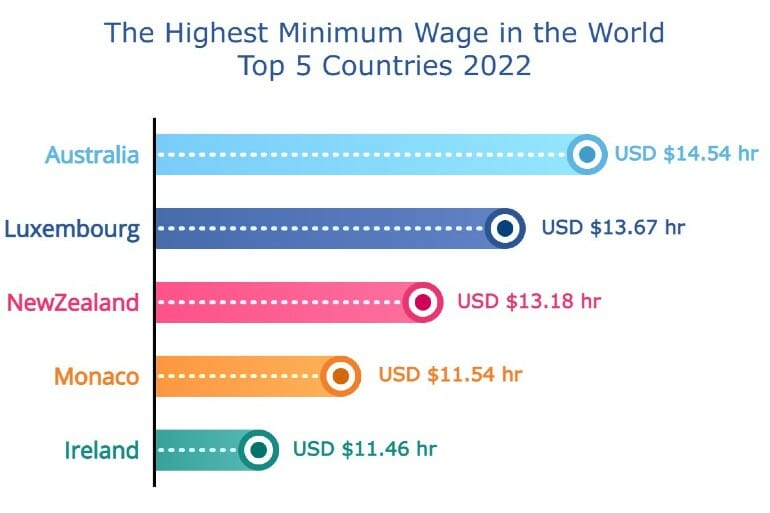Minimum National Wage Increase FY 2023
By Paolo, 18.06.2022
On the 15th of June 2022 the Fair Work Commission completed its review of next year’s minimum wage and announced the increase of the National Minimum Wage for the 2023 Financial Year:
- 5.2% increase applicable to the National Minimum Wage, raising it from $20.33 per hour to $21.38 per hour;
- 4.6% increase to the National Minimum Wage applicable for Modern Awards and Enterprise Agreements’ wages.
Casual employees will still receive an additional 25% Casual Loading.
The increase for employees earning minimum wages applies from the first full pay period starting on or after 1 July 2022.
Employees working under most of the 122 Awards will also receive the increase at the same time.
However, for workers in the aviation, tourism and hospitality industries, the increase will start from the first full pay period starting on or after 1 October 2022. These Awards are:
- Alpine Resorts Award;
- Aircraft Cabin Crew Award;
- Airline Operations – Ground Staff Award;
- Air Pilots Award;
- Airport Employees Award;
- Airservices Australia Enterprise Award 2016;
- Hospitality Industry (General) Award;
- Marine Tourism and Charter Vessels Award;
- Registered and Licensed Clubs Award;
- Restaurant Industry Award.
Fair Work Australia is currently updating the Pay Tools with the new rates. The FY 2023 Pay Tools will be available by the start of July 2022.
What is the National Minimum Wage
The National Minimum Wage is the employee’s base rate of pay for ordinary hours worked.
The National Minimum wage is the base rate applicable to award or agreement-free workers. The Award National Minimum Wage instead, is the Level 1 pay rate applicable to workers classified under the award that covers their industry or occupation.
This means an employee cannot be paid less than their applicable minimum wage, even if they agree to it.
The National Minimum Wage is reviewed each year by the Fair Work Commission. After the review is completed, a National Minimum Wage Order is issued. This generally applies from the first full pay period on or after the 1st of July. However, in recent years the Fair Work Commission has adopted a staggered rollout to support employers from industries impacted by either COVID or natural disasters.
The National Minimum Wage Revision must include the rates applicable to the following workers:
- Adult employees;
- Junior employees;
- Junior or Adult trainees and apprentices;
- Employees with a disability.
The National Minimum Wage is currently $20.23 per hour, or $772.60 for a 38-hour week (before tax), and is set to increase to $21.38 (812.60 per week) from 1 July 2022.
Casual employees covered by the national minimum wage are entitled to receive at least an additional 25% casual loading.

Current economical situation
The increase of 5.2% of the National Minimum Wage is the highest since 2012 and keeps Australia at the top of the world’s minimum wages.
In making the decision, the Fair Work Commission considered the key differences in the economy between last year’s review and this year, including a CPI increase of 5.1% and inflation of 2.6%.
The Fair Work Commission rejected the proposal from Unions to increase the minimum wage to 5.5% stating that an increase of that rate, together with the increase of other payroll costs, including the Superannuation Statutory Rate, would pose a real risk of significant adverse effects to the national economy.
The Government made a submission to the Fair Work Commission in support of a pay rise of 5.2% for workers paid minimum wage.
The increase went ahead despite being opposed by the Morrison Government, and the Fair Work Commission settled on a 5.2% increase for Award Free workers and 4.6% for employees working under an Award or an Enterprise Agreement.
The 5.2% National Minimum Wage increase is just higher than the current 5.1% CPI. In the past 10 years, the Fair Work Commission granted an increase above the inflation rate only on one other occasion (2020).
However, given the projections of inflation rising above 7% before the next Financial Year, it is predicted that Australian workers on minimum wages will still be at a disadvantage.
While this significant wage rise is positive news for the workers, it represents an additional burden for employers, particularly small businesses struggling to deal with inflationary pressures and still in the process to rebuild their activities after the COVID pandemic, the Australian floods and bushfires.
According to the Australian Bureau of Statistics (ABS), in response to the increased payroll costs and to the current economical environment, more than a third (39%) of all businesses expect to significantly raise the price of their products or services.
“By industry, results showed 59% of retail trade businesses expect their prices to increase more than normal over the next three months. Both the construction (58%) and manufacturing (55%) industries are the next most likely to expect price increases.”
John Shepherd, ABS Head of Statistics.
On the other hand, the reality for a number of employers is that, given employee shortages across most industries, the actual increase in minimum wages may have little impact. Employers are currently willing to pay well above minimum wages to attract and retain staff.

New Fair Work Pay Rates Open-Source API
The Fair Work Commission (FWC) is currently working on an ‘Application Programming Interface‘ (API) for Awards’ wage and entitlements rates designed to save businesses time and reduce the risk of underpaying employees.
This Open-Source API will create a gateway between the commission’s modern awards pay (MAP) internal database and the Direct Service Providers that develop Payroll Software applications. The API will connect the Fair Work data directly to the Payroll Software applications, reducing the amount of manual handling required.
While the API will help maintain the correct pay rates and reduce the margin for error, businesses will still have to correctly select the award and relevant classification.
The API is nearing completion, however, the Fair Work Commission says it will not be rolled out in time for the FY 2023 Annual Wage increase. Software Companies may start having access to it at some point in the 2023 Financial Year.
Other Payroll Changes coming in FY 2023
In addition to the significant National Minimum Wage increase for FY 2023, the Australian Government is also rolling out updates to superannuation and the annual indexation of Study or Training Loan support (HECS or HELP debts).
Superannuation Changes
The key Superannuation changes coming into the FY 2023 are:
- The removal of the $450 monthly eligibility threshold;
- The increase of the Superannuation Guarantee Statutory rate to 10.5%
For more detailed information about these changes, please refer to our other blog published on our website.
Update to the indexation of Study or Training Loan Supports (STSL)
Each year, the indexation rate applied to STSL loans changes based on the consumer price index (CPI). Indexation maintains the real value of the loan by adjusting it in line with shifts in the cost of living.
This year’s indexation is set at 3.9%, impacting the following loans:
- Higher Education Loan Program (HELP – formerly known as HECS);
- VET Student Loan (VSL);
- Student Financial Supplement Scheme (SFSS);
- Student Start-up Loan (SSL);
- ABSTUDY Student Start-up Loan (ABSTUDY SSL);
- Trade Support Loan (TSL).
Additional Employment Costs Increases for NSW Businesses
NSW Employers will also have to take into account two additional employment cost increases:
- The percentage of NSW Payroll Tax is set to return to 5.45% after the reduction of 4.85% during the COVID Pandemic;
- The average premium rate for NSW Workers’ Compensation is also set to increase by 2.9% across the scheme.
What do these payroll changes mean for employers
Australian Employers should start planning for these changes and take appropriate action to ensure they maintain compliance and have the required cash flow to support this new surge in employment costs.
It is important for businesses of any size to conduct regular performance reviews and business planning activities, including:
- Conducting a comparison review between payroll costs and prices of services rendered. If required, increasing the cost of their services in order to maintain the required Gross Profit and still run their business at a profit;
- Performing a wage audit to ensure all their workers (especially the ones paid on Salary packages) are still paid the correct award rates, or above;
- Forecasting additional costs and making sure the appropriate cash is put aside to cover quarterly obligations like PAYGW and Superannuation;
- Review their payroll system settings and make sure they are updated as per all the changes starting on 1st July 2022. Businesses using multiple systems to track employment times and process payroll, should perform a comprehensive review and ensure the payroll information still integrates correctly and is updated across all systems.
- And finally, have a communication plan in place that includes both how to notify their workers about the changes as well as their customers in case of an increase in prices of their products and services.
“Now is the time to check whether those employees on salaries are meeting the National Minimum Wage conditions contained in a Modern Award on or before the first full pay period after 1 July 2022, which is when the minimum wage increases take effect.”
Sean Wilson, CEO Better HR
The 2023 Financial Year brings a new wave of changes impacting Australian employers’ compliance requirements. Furthermore, a new surge in employment costs puts both business profitability and cash flow at risk once again.
With a large number of businesses still vulnerable from the COVID Pandemic and some of the gravest natural disasters impacting Australia over the last 10 years, business survival is a serious concern.
Australian Businesses should seriously consider outsourcing their financial responsibilities to a registered (and knowledgeable) professional that can help them with understanding compliance requirement changes, effectively managing their costs and maintaining profitability.
References
https://www.mappr.co/highest-minimum-wage-in-the-world/
Disclaimer
This blog and attached resources are of general nature designed for informational and educational purposes only. They should not be construed as professional financial advice for your individual business. Should you need such advice, consult a licensed financial or tax advisor.




